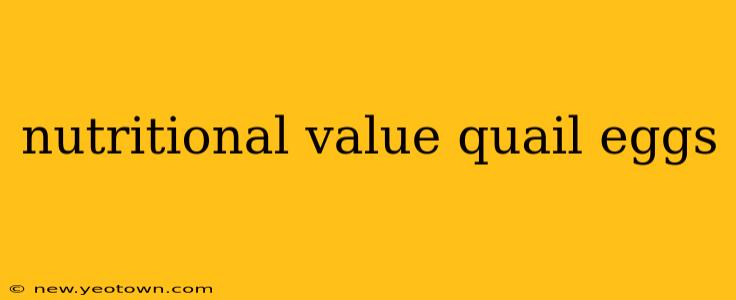Quail eggs, those tiny speckled treasures, are more than just a culinary curiosity. They're packed with nutrients, offering a surprisingly potent nutritional punch far exceeding their diminutive size. For centuries, cultures across the globe have recognized their health benefits, and modern science is increasingly validating their nutritional prowess. Let's delve into the remarkable world of quail eggs and uncover the secrets behind their nutritional value.
What are the nutritional benefits of quail eggs?
This is the quintessential question, and the answer is multifaceted. Compared to chicken eggs, quail eggs boast a higher concentration of several key vitamins and minerals. They are exceptionally rich in protein, vital for building and repairing tissues. Furthermore, they contain essential fatty acids, crucial for brain health and overall well-being. Vitamins like A, B vitamins (including B12, often lacking in vegetarian diets), D, and E are all present in significant amounts. Minerals like iron, phosphorus, and selenium contribute to various bodily functions, from energy production to immune support.
Are quail eggs better than chicken eggs?
This isn't a simple "yes" or "no" answer. Both quail and chicken eggs offer valuable nutrition. However, quail eggs often win on concentration. They contain higher levels of certain nutrients per unit weight. Think of it like this: a small, potent package versus a larger, less concentrated one. While chicken eggs provide essential nutrients in larger quantities overall, quail eggs provide a more concentrated dose of some key nutrients. The "better" choice depends on individual dietary needs and preferences.
How many quail eggs should I eat per day?
There’s no magic number. The appropriate amount depends on individual factors like age, activity level, and overall health goals. However, moderate consumption is generally recommended. Starting with a few quail eggs per day (e.g., 2-3) is a good approach. It’s always wise to consult a healthcare professional or registered dietitian to determine the optimal intake based on your specific circumstances.
What are the health benefits of quail eggs?
The nutritional richness of quail eggs translates into a multitude of potential health benefits. Their high protein content aids in muscle growth and repair. The abundance of vitamins and minerals contributes to improved immune function, stronger bones, and healthier skin. Some studies even suggest that quail eggs may help manage cholesterol levels and potentially offer benefits for those with certain respiratory conditions. However, more research is needed to solidify these claims. Remember, moderation and a balanced diet are key.
Are quail eggs good for weight loss?
While quail eggs are nutritious and protein-rich – a nutrient that aids in satiety – they aren't a magical weight-loss food. Weight management depends on a holistic approach that includes a balanced diet, regular exercise, and mindful eating habits. Quail eggs, as part of a healthy diet, can contribute to feelings of fullness and provide essential nutrients. However, consuming them excessively won't automatically lead to weight loss.
Do quail eggs have cholesterol?
Yes, quail eggs contain cholesterol, like all eggs. However, the amount is relatively modest. The impact of dietary cholesterol on blood cholesterol levels is a complex subject that's still being researched. Moderation remains key, and individual responses to dietary cholesterol vary. If you have concerns about cholesterol intake, it's always wise to consult with a doctor or registered dietitian.
Conclusion:
Quail eggs are a truly remarkable food source. Their concentrated nutritional profile makes them a valuable addition to a healthy diet, offering numerous potential health benefits. However, remember that a balanced approach to nutrition is always best. Enjoy quail eggs as part of a varied and nourishing meal plan, and consult with healthcare professionals for personalized dietary guidance.

